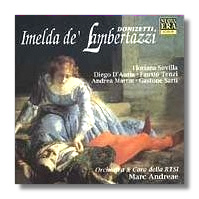
The Internet's Premier Classical Music Source
Related Links
- Donizetti Reviews
- Latest Reviews
- More Reviews
-
By Composer
-
Collections
DVD & Blu-ray
Books
Concert Reviews
Articles/Interviews
Software
Audio
Search Amazon
Recommended Links
Site News
 CD Review
CD Review
Gaetano Donizetti

Imelda de' Lambertazzi
- Imelda - Floriana Sovilla, soprano
- Lamberto Lambertazzi - Diego D'Auria, tenor
- Orlando Lambertazzi - Fausto Tenzi, tenor
- Bonifacio Geremei - Andrea Martin, baritone
- Ubaldo - Gastone Sarti, baritone
Swiss Italian Radio-Television Chorus
Swiss Italian Radio-Television Orchestra/Marc Andreae
Nuova Era 6778/79 2CDs Recorded February 1989
This opera in a sense marked the end of Donizetti's apprenticeship; his next effort, also written and produced in 1830, was Anna Bolena, the first of his mature and highly successful works. Imelda was received well at its première in Naples but didn't stay in the repertory very long, probably because – while it is consistently tuneful – it contains no really memorable arias, and possibly because its grim ending did not please the public.
The plot is a variant of the familiar story of Roméo and Juliet, based an 1825 play by Gabriele Sperduti describing a supposedly historical incident in the 13th-century wars between the Guelphs and the Ghibellines. Sgricci had already set the concise and dramatically effective libretto by Andrea Leone Tottola to music in 1827. Lamberto, patriarch of the Lambertazzi family, is goaded into continuing conflict with the Geremei family by his son Orlando; and after his daughter Imelda is forced to disclose her love for Bonifacio, an emissary sent by the rival clan to sue for piece, Orlando kills Bonifacio (off-stage) with a poisoned sword. Imelda sucks the blood from his wound and, dying, is dragged on stage by her brother and rejected scornfully by her father. Not a pretty picture, but it presages Verdi in its confrontation of love and duty, and Donizetti's music brings it vividly to life.
In recent years a considerable number of obscure Italian operas have been presented on provincial stages and have turned up on CDs, often pirated (Italian copyright laws were lax until very recently), and widely variable in quality of performance and sound. This one, from an 1989 performance in Lugano, is pretty good. The role assignments are a bit odd, with a baritone rather than a tenor taking the male lead, and the soprano given a great deal to do in the mezzo range. There are no great voices in the cast, but all of them are competent, singing out clearly and forcefully in a broad Italianate style, with little tonal allure and not much effort at characterization. The orchestra and chorus do well under Marc Andreae's alert direction, and the sound is good. Interesting notes, but the libretto is in Italian only. Not top-drawer Donizetti, it is true, but an enjoyable show nonetheless.
Copyright © 1999, Alexander J. Morin


















